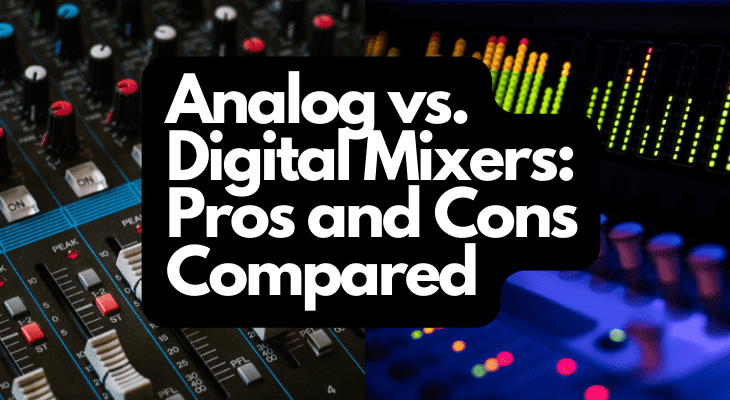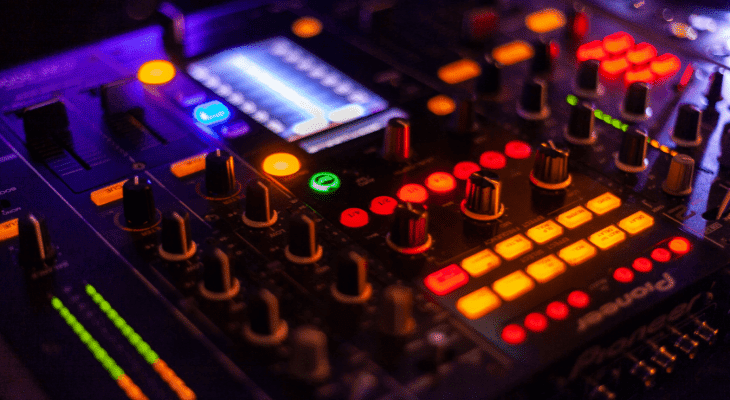Mixers are fantastic tools for processing music, but they can be confusing if you’ve never used one before. The two most popular mixer types are digital and analog, and each comes with its own pros and cons that might make one better for you than the other.
Analog mixers are reliable, beginner-friendly, and more affordable than digital mixers, although they don’t have as many features and special effects. Digital mixers are more complicated, but they offer more special effects, features, and presets in a much smaller package.
So, let’s get into the details and discuss the similarities and differences between analog and digital mixers together. I’ll tell you about all the pros and cons of each type of mixer and help you decide which one is best for you and the kind of sound you’ll be mixing.

The Similarities Between Analog and Digital Mixers
Mixers do just what their name implies– they mix sound, combining the signal from multiple instruments and microphones into one stereo or multi-channel output.
All mixers work the same, regardless of whether they’re digital or analog. These consoles have inputs, usually XLR
or TRS jacks, that allow you to connect any piece of audio equipment to the mixer.
During performances, mixers can also provide phantom power to mics and reroute sound to headphones, making them an essential piece of equipment for performing artists of all sorts.
Each input you connect to the console has a different channel on a mixer. These channels are laid out vertically into “channel strips.” Each line usually has EQ knobs for low, mid, high frequencies and compression, a stereo pan adjustment to designate left or right speakers, channel faders, and gain adjustments for volume.
There are also main output level faders that adjust the volume of the entire track. Some mixers include special effects adjustments located near the main output faders, to the console’s left.
Finally, there’s always a line output (usually an XLR jack) so that you can record or amplify the sound straight from the mixer.
These features are common to almost any mixer. However, there’s more to mixers than just their similarities, and you’ll find that each type has some extra features that help distinguish it from the other.
The Pros and Cons of Analog Mixers
Here’s a table showing the summary of the pros and cons of analog mixers:
| Pros | Cons |
| Analog mixers are more affordable | Analog mixers aren’t as versatile as digital mixers |
| Analog mixers are easier to use | You may need more hardware to add effects |
| Analog mixers are reliable | Analog mixers can be bulkier than digital mixers |
Pros of Analog Mixers
Analog Mixers Are More Affordable
One of the main reasons to choose an analog mixer over a digital mixer is that they’re more affordable.
Since analog consoles are much simpler than digital mixers, they usually come at a lower cost. In addition, analog mixers have been around longer than digital, making them much easier to find used at a much lower price.
So, analog is usually the best choice for people who want a budget option and beginners who want to master the basics without breaking the bank.
Analog Mixers Are Easier To Use
Analog mixers don’t have any hidden menus. When you look at one, you’ll see all of the features that an analog mixer has by looking at the knobs, buttons, and faders.
Because there are no digital menus for you to navigate through on these consoles, learning to use an analog mixer is usually much more straightforward than learning to use a digital one. Every control is laid out and labeled right before you, allowing you to use the device without having to learn about any complicated settings.
In addition, it’s much easier to use an analog console quickly since you don’t need to fiddle with computerized settings on your mixer. When you use analog, you won’t have to navigate menus and find the proper channels using buttons and presets– all you have to do is look at the mixer.
Analog Mixers Are Reliable
If you want a mixer that’ll be completely reliable and resistant to errors, analog is the way to go.
Since analog mixers aren’t computerized, they can’t glitch or freeze up, making them much more reliable than digital mixers. They can’t develop system errors or other computer-related issues, so they’re harder to break than digital consoles.
Cons of Analog Mixers
Analog Mixers Aren’t As Versatile as Digital Mixers
With analog mixers, what you see is what you get.
Analog mixers can only have as many channels as the number of vertical columns you see on the console, and they rarely include special effects settings for individual channels.
You also can’t use preset functions, remote controls, output processing, or digital snakes with an analog mixer, limiting the sound you can get from it.
You May Need More Hardware To Add Effects
Because analog mixers aren’t as versatile as digital ones, you need to use added-on hardware to incorporate special effects, sampling, and playback features.
Digital mixers have built-in features that can perform these operations while mixing. They’re much easier to use when you don’t want to post-process your track, and they’re also ideal for incorporating special effects into a live performance.
Another thing to mention – when you record using analog mixers and want to add special effects later, you may experience some extra distortion, and you can’t isolate certain sounds as well, which may reduce the sound quality.
Analog Mixers Can Be Bulkier Than Digital Mixers
Since digital mixers only have as many channels as the number of inputs on your console, they’re usually much more extensive than digital mixers with the same line-ins.
Although space may not be an issue if you only want a small 6-channel mixer, when you’re looking for a console with over 100 lines (which isn’t uncommon in live performances or recording studios), choosing digital over analog can save you tons of space.
Also, analog mixers may be too bulky to transport if you’re often on the road.
The Pros and Cons of Digital Mixers
Here’s a table showing the summary of the pros and cons of digital mixers:
| Pros | Cons |
| Digital mixers have automated features and remote control | Digital mixers are usually more expensive |
| You can add effects on the console | Digital mixers have a higher learning curve |
| Digital mixers offer more channels in a smaller space | Digital mixers take more time to use |
Pros of Digital Mixers
Digital Mixers Have Automated Features and Remote Control
Digital mixers usually have built-in computers that allow you to add special effects to specific channels, use saved presets, and remotely control your mixer with a tablet, phone, or computer.
These features aren’t usually found on an analog mixer. To use them, you’ll usually have to purchase another piece of equipment and connect it to your analog console.
Still, controlling the mixer remotely and programming preset settings is impossible on some analog consoles, making live performances or recording much more challenging for the person sitting behind the mixer.
You Can Add Effects on the Console
Digital mixers are a one-stop shop for great-sounding audio, and they can eliminate the need for any after-editing.
Have you ever used an electric keyboard with hundreds of different sounds and effects? Well, that’s basically what a digital mixer can do. It can change the effects for each channel, allowing you to specify different settings for each mic or instrument and playback each one when necessary.
Different mixers have different effects – however, in general, digital mixers usually have hundreds of different settings that allow you to master and edit your sound in one take. So, if you work heavily with special effects and distortion or want to add different alterations to different sounds, digital is the way to go.
Digital Mixers Offer More Channels in a Smaller Space
Digital mixers are usually smaller than their analog counterparts with the same channels since they have controls that allow you to re-use a channel for a separate input.
Let’s break that down into an example. These mixers work a bit like a car radio in this way. You can pre-set your favorite channels to buttons with numbers on them in most cars. Usually, creating both an FM1 setting and an FM2 setting allows you to save even more radio channels using the same button for two separate radio stations.
Like these car radios, digital mixers can use presets to maximize the number of channels you can use, all without taking up more space on the console. So, digital mixers can maximize your space by allowing you to have more channels than meets the eye.
Cons of Digital Mixers
Digital Mixers Are Usually More Expensive
Since digital mixers have so many moving parts and complicated digital effects, they can be more expensive than their analog counterparts with the same number of channels.
However, although the price of a digital console is usually higher than analog, you may have to purchase more add-on hardware for analog mixers to achieve the special effects that digital can automatically do.
Digital Mixers Have a Higher Learning Curve
With all of these complex features that make digital mixers so versatile comes a higher learning curve. Using the automated menus on a digital mixer and figuring out what the buttons do takes a bit of guidance and practice, which is why most people start out using an analog mixer.
Because digital mixers have tons of features that can be difficult to figure out, they’re usually not recommended for venues or public places where entertainers regularly change.
Digital Mixers Take More Time To Use
Opening up a computerized menu and navigating through the options takes much more time than sliding up a fader, which is why digital mixers take more time to use.
In situations where you need to make last-minute changes to your mixer’s settings, using an analog mixer is better than digital. That’s because, with analog, all of the settings are out in the open on the console, while with digital, some of the settings may be buried deep in the digital menus.
Do Digital Mixers Sound Better Than Analog Mixers?
If you’ve researched the difference between digital and analog mixers, you’ve probably noticed the many conflicting claims about which one sounds better. These claims are mostly opinions, and there are few authentic differences between the sound quality of each type of mixer.
The raw sound from digital mixers sounds the same as the raw sound from analog mixers, and all claims that one is better than another boil down to personal preference.
However, as I mentioned before, editing analog-recorded sound and adding effects after the sound has gone through the mixer introduce distortion to your recordings.
Analog mixers are also sensitive to conditions such as dust, dirt, and power surges, which may add extra distortion and white noise to your stereo output.
So, the audio is very much the same when it comes to the raw sound produced from the mixer without any post-processing.

When To Use a Digital Mixer
Digital mixers are perfect for performers who use special effects or repeatedly play the same set. That’s because digital mixers will allow you to save your settings and play them back without manually adjusting the console. You can even make adjustments from on-stage with the remote controlling feature.
Digital is also a better option for recording artists since more effects are available on the console, and editing after mixing will not increase distortion in a track.
When To Use an Analog Mixer
Analog mixers are user-friendly and straightforward, although they may not be ideal for band performances with many instruments and special effects.
However, they can be beneficial if you often have to make quick changes, and they’re ideal for environments like bars and clubs where the band or performers change every night. Analog mixers are also great for public spaces where not everyone knows how to use a mixer and where complicated effects are undesirable.
Analog is also a go-to for DJs since you can make so many changes to the sound on the spot and won’t need to add more effects to the sound later.
I also recommend analog for beginner and amateur sound artists – learning to use analog is easier and will help you understand the complexities of digital mixing.
Conclusion
Analog and digital mixers do the same thing, combining channels to make one seamless soundtrack. However, there are some essential differences between them. Analog mixers are simple, reliable, and more affordable, but they aren’t as versatile or compact as digital mixers.
Digital mixers have built-in effects, remote control features and usually have more channels in less space, but they can also be more expensive and challenging to master.
Sources
- Sweetwater: Parts of a Mixer
- Live Sound Expert: 13 Benefits of Using Digital Mixers (and a few negatives)
- Yamaha: Better Sound for Commercial Installations
- It’s About Music: Analog vs Digital mixer: Is Digital Superior to Analog?
- Sweetwater: Live Sound Mixers: Analog vs. Digital- Which is Right For You?
- Church Sound Tips: Analog vs. Digital Live Sound Mixing Consoles
- The Home Recordings: Analog Vs Digital Mixers; Here Are the Differences!
Recent Posts
QuickTime is a vital app for many Mac users, and if you’ve recently bought a new microphone, you might wonder how to use it optimally. QuickTime cannot record audio content if it doesn’t have...
Every microphone leaves a unique signature on the quality of its output. If you’re a podcaster trying to melt your way into your audience’s hearts, a muddy, distorted recording won’t cut it....
